
|
Some people wonder if Strom woke up, heard the news about the sodomy decision, and keeled over dead. His premature death at the age of 100 may have been due to his dangerous heterosexual lifestyle and his bigamous marriages to younger women. (Bigamy is banned under religious laws and it is defined as remarriage after the death of a spouse. Many secular laws confuse bigamy with polygamy, which is marriage with several spouses at once.) In addition to the "separate but equal" flavor of the sodomy decision, I believe the media coverage of this decision was ignorant and biased. Both the decision and the media coverage reflect our society's views on gay people. Scrutinizing the sodomy decision requires looking in detail at examples of both biased media coverage and the legal language contained in the decision. In brief, the media coverage was biased because they largely portrayed this as being a "gay sex" issue and they reported, without rebuttal, Scalia's scare tactic that this would lead to gay marriage and legal bigamy. The media also confused the issues of equal protection and privacy. Many reports diminished the importance of sodomy laws by saying they were rarely enforced and that they remained in only a few states. But few reports mentioned how the 1986 sodomy decision was used to discriminate against gays and to deny child custody. The case wasn't just about "gay sex." But TV and radio did not communicate this fact to the masses. Likewise, the decision has a "separate but equal" flavor because it used "legal code words" that firmly endorse the popular idea that sexual orientation does not deserve the same legal protections provided to race and religion. The implication is that gays can and will be legally discriminated against in ways that would never be permitted if race or religion were involved. Hence, "civil unions" is the best gays can expect to get. Few mainstream reports explain the "legal code words" used in the sodomy decision. I would not have understood these words if I had not recently finished reading the book, Courting Justice, by Joyce Murdoch and Deb Price. (Basic Books, 2001, 6"x9" paperback, 582 pages) Journalists Murdoch and Price, a lesbian couple since 1985, do an excellent job of explaining the major Supreme Court rulings that have affected gay men and lesbians over the last fifty years. I do not pretend to be a legal expert, but after carefully reading the entire decision and the book Courting Justice I feel qualified to share my analysis. Corrections are welcomed.
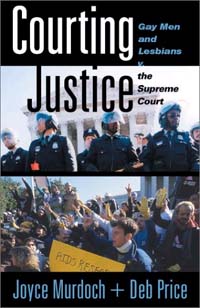 If you want to verify my analysis, I have provided page numbers in the book Courting
Justice for your reference. I also refer to page numbers in the decision,
as they appear printed on each page in the Adobe Acrobat PDF version of
the decision. A fifty-two page PDF can be downloaded from: http://news.findlaw.com/hdocs/docs/scotus/lwrnctx62603opn.pdf
If you want to verify my analysis, I have provided page numbers in the book Courting
Justice for your reference. I also refer to page numbers in the decision,
as they appear printed on each page in the Adobe Acrobat PDF version of
the decision. A fifty-two page PDF can be downloaded from: http://news.findlaw.com/hdocs/docs/scotus/lwrnctx62603opn.pdf
Note that the page numbers restart from one in each section and they do not match the 52 sequential page numbers displayed by the Acrobat reader program. There are four sections: Justice Kennedy wrote the Opinion of the Court, Justice O'Conner wrote a concurrence, Justice Scalia wrote a dissent, and Justice Thomas wrote a separate dissent. For convenience in looking up the court rulings that are referenced in decision a hypertext-linked version, but without page numbers, is available at: http://caselaw.lp.findlaw.com/cgi-bin/getcase.pl?court=US&navby=case&vol=000&invol=02-102 The privacy aspects of this case were widely reported by the mainstream media. I suspect that most people formed their opinion solely on the privacy issue because it was easy to understand. Namely, most people do not want their own bedrooms policed. And to anti-abortion people, "privacy" is bad because they think the Supreme Court "created" this right to make abortion legal. For the large part, only the more detailed newspaper accounts explained the equal protection aspects of the case. Namely, the fact that, in Texas, sodomy was legal for heterosexuals but it was illegal for homosexuals. The equal protection clause of the Constitution requires that laws apply equally to everybody. Also, few reports explained the significance of the court overturning the previous 1986 Bowers v. Hardwick sodomy ruling on privacy grounds and the Texas sodomy law on equal protection grounds as well. Sodomy laws that applied to both straights and gays would still be legal if the Court had just ruled on the equal protection issue. But the Court's decision was much broader because it said that the right to privacy permits consenting adults to do any harmless and noncommercial sexual activity in private. Note the conservatives' scare tactics are wrong, this ruling specifically says it does not apply to harmful or nonconsensual activities in private, such as child abuse, and commercial activity, such as drugs or prostitution. (See pp. 17-18 of Kennedy opinion) Despite what anti-gays say about privacy not being in the Constitution, "liberty" is a constitutional right and it is at the heart of the sodomy ruling. (See p. 1 of Kennedy opinion) The Constitutional right to "liberty" is driving anti-gay conservatives into a tizzy. For example, read the link to Cal Thomas' view on sodomy and liberty in my Gay Today Pen Points, "Dear Cal Thomas, Liberty Starts at Home!" http://www.gaytoday.com/penpoints/041403pp.asp The decision also contained some "legal code words" that were not explained at all by the mainstream media. Specifically, the highly technical legal language "strict scrutiny" and "rational-basis" was used in the decision. (See p. 1 of O'Conner's concurrence, pp. 1-2, 4, 6, 8-12, 14-16, of Scalia's dissent) Most laws need only be "rational" to be constitutional. States that pass a law that discriminates against gays only have to show a "rational-basis" for the law. But racist laws must be subjected to "strict scrutiny" and are unconstitutional unless justified by a "compelling state interest" and narrowly tailored to advance it. The book Courting Justice explains these legal nuances on pages 210, 245, 247, 325, 379, 420, 444, 457-458, 462, 469, 476, 492, 518, 520, and 525. Understanding the differences between the Supreme Court's doctrines of "rational-basis" and "strict scrutiny" is crucial to understanding how the Supreme Court is treating sexual orientation differently from race or religion. But I could not find any major newspaper story that explained these differences. As expected, all of the radio and TV news coverage glossed over these legal nuances. Their sensationalistic coverage typically asked if this decision was the death of marriage or the legalization of all private behaviors, such as child abuse. Since I live in the west coast time zone, to hear the decision I started watching CNN, MSNBC and Fox News at 7 AM, which is 10 AM east coast time. At about 7:20 AM Fox News was the first to report that the sodomy laws had been overturned based on privacy. MSNBC also reported the ruling seconds later but was unsure if it was based on privacy or equal protection grounds.
I also monitored the TV broadcast networks ABC and NBC. Normally, the networks' Good Morning America and Today morning news shows are video taped and shown three hours later for the west coast time zone. However, the videotape is often preempted for breaking live news stories. Often, these live news stories are not seen back east because most local stations are reluctant to preempt daytime soap operas or local programming. When the Supreme Court decision on affirmative action was announced on the Monday before the sodomy decision, ABC had their main evening anchor, Peter Jennings, do a special live report. Peter Jennings rarely does this except for really big stories. Normally the Good Morning America anchors do the live news updates. But when the sodomy decision occurred, there was no Peter Jennings, and no ABC special report at all! Apparently, ABC considered the sodomy ruling as less newsworthy than the affirmative action ruling. Or maybe they were watching CNN for their news. While reading the Internet news accounts, I tuned in several of the conservative talk radio shows. Unfortunately, Rush Limbaugh and Bill O'Reilly were on at the same time. But since Rush is on the decline, I tuned to Bill O'Reilly. Predictably, O'Reilly was bragging that he had correctly predicted that sodomy laws would be overturned. O'Reilly agreed with the decision, but few of his callers did. The hostility toward gays was unpalatable, but everyone insisted, as did Justice Scalia on page 19 of his dissent, "I have nothing against homosexuals." On the day of the sodomy decision, the online poll of Fox News TV and radio host Bill O'Reilly http://www.billoreilly.com asked his mostly conservative audience, "Was the Supreme Court ruling striking down the Texas sodomy law correct?" The vote was nearly equally divided, suggesting that many see this as just a gay sex issue or a threat to traditional marriage. Another clue to how O'Reilly's audience views the sodomy issue was in a previous poll on April 24, where 69 percent said NO to the question, "Does the U.S. Government have the right to criminalize sexual activity between consenting adults?" This suggests that heterosexuals want the right to privacy for their own blowjobs, but they don't want to approve of gay sex as the Supreme Court did. A highly popular regional radio talk show host Lars Larson http://www.larslarson.com opened his program complaining that the sodomy decision would undermine marriage and that the right to privacy would permit incest and pedophilia. Lars Larson was also coincidentally filling in that day for Michael Savage's controversial national radio show, "Savage Nation." Larson and Savage are nearly indistinguishable but it was disappointing to miss Savage's rant on this topic. Amazingly, Lars interviewed an attorney who accurately corrected Lars' misunderstanding of the decision. Of course, it didn't change Lars' mind. Lars Larson's sodomy poll had to be the strangest one I have ever seen. He asked, "With today's ruling, has the Supreme Court decided the issue of gay marriage?" This was an interesting question but the two choices were, "Yes, states can deny gay marriage" or "No, states can still restrict marriage to male/female union." The poll question and answers were clearly designed to prevent any liberals from voting! I don't know what this means, if anything, but virtually everyone voted no.
His diatribe lasted until about 20 minutes after the hour. During the break, somebody must have corrected him about his misinterpretation of the Kansas case. He came back on and admitted that he "might have been wrong" and that "maybe" the Supreme Court was only asking Kansas to make their law equal between heterosexuals and homosexuals. The problem with this short, belated correction is that most people only listen to a few minutes of Rush while driving or doing other things. I'm sure most listeners will only remember the first 10 to 15 minutes where Rush insisted that a pedophile was being let go because of the right to privacy. Rush's short correction did not adequately explain the injustice in the Kansas case. An act of gay oral sex netted somebody a 17-year sentence, but the sentence would have been less than 15 month for a heterosexual oral sex act. Rush also worried that many conservatives were incorrectly bashing Scalia for supporting the "gay agenda." Scalia actually said he supported homosexuals "promoting their agenda through normal democratic means." (See p. 19 of Scalia dissent) Scalia believes the majority may vote away all rights of a minority except for their "fundamental rights," which he claims do not include "homosexual conduct." Not surprisingly, most of the callers and the talk radio hosts were ignorant of the basic legal concepts in the sodomy case. For example, Bill O'Reilly ignorantly pulled out his copy of the Constitution and quoted the 4th Amendment, prohibiting unreasonable search and seizure, as being the basis of the privacy decision. In fact, the case was actually decided on both liberty and equal protection, which are part of the 14th Amendment. Similarly, in response to the sodomy decision, President Bush's press secretary ignorantly noted that he had not filed a brief and that this was now "a state matter." In fact, the Supreme Court's decision took what had been a state-by-state matter and pronounced a binding national constitutional principle. Recall that "state rights" was the "code word" used by segregationists, such as Strom Thurmond, to justify Jim Crow laws in their states. Rush Limbaugh also invoked "state rights" when he criticized Bush for not saying anything about this case. Bush is allowing other Republicans to spread the unfounded scare tactic that privacy rights will permit all kinds of disgusting behavior. (See pp. 5-6, 13, 15, 17 of Scalia's dissent where he compares homosexuality to unmarried sex, adultery, public indecency, bigamy, same-sex marriage, adult incest, prostitution, masturbation, adultery, fornication, bestiality, obscenity, surname restrictions, military don't ask policies, child pornography, and nudism. He does not mention that in previous court rulings the First Amendment protected nudism and nude dancing.) But it is clearly spelled out in the sodomy decision that an adult's right to privacy does not permit nonconsensual or harmful activities, such as child abuse, or unregulated commercial activities, such as drugs or prostitution. (See pp. 17-18 of Kennedy opinion)
If you think this is paranoid thinking, note that an active movement is underway in the House to pass such an anti-gay marriage Amendment. Even if you don't care about gay marriage, you should care that American may become the only major country on Earth that sanctions gay bigotry in their constitution. (See "Is gay marriage next?" cover story, Newsweek July 7, 2003, pp. 5-6, 38-52, http://www.msnbc.com/news/932621.asp?0cv=CB20) Of course, most of the "liberal" Democratic presidential candidates say they want "civil unions" instead of "gay marriage." The polls also support this view. I say if it smells like "separate but equal," then it is "separate but equal." The article, "When 'hate' became resolve: State's Amendment 2 led to gay protections," (Michael Booth, Denver Post, 9/29/2002 Sunday 1st Edition, p. A-01) describes how gay groups became stronger in the ten years after the anti-gay Amendment 2 passed in Colorado. Both sides agreed that the defeat galvanized the gay community into organizing and fighting. This sodomy decision will probably also galvanize efforts to pass an anti-gay marriage Amendment to the Constitution. In the above Denver Post article, Will Perkins mentions that he supports an amendment to the U.S. Constitution to force marriages to be heterosexual. Perkins along with Kevin Tebedo invented the very popular idea that gays have "special rights," which needed to be outlawed by Amendment 2. A conservative panelist, George Will, predicted on the ABC Sunday news program, This Week, that an anti-gay marriage amendment could happen in record time. All of the panelists nodded in agreement. Likewise, Senator Majority Leader Bill Frist announced his support of an anti-gay marriage amendment while hypocritically invoking "state rights." Ditto on Rush Limbaugh's Tuesday radio show. Ditto on Michael Savage's Tuesday show. An anti-gay marriage amendment would be tragic, and I see no strategy from gay leaders to stop it from happening. Even if gays are granted "civil unions" as a compromise, gays will still be "separate but equal." Several years ago, I found, in a Colorado Springs used bookstore, the self-published book, Gay Politics vs. Colorado and America: The Inside Story of Amendment 2, by Stephen Bransford. (Sardis Press, Cascade, Colorado, 1994, 6"x9" hardback, 291 page) The author of this slick looking book was the media advisor to the anti-gay Colorado for Family Values organization that backed Amendment 2. This book was used in many other states as the blueprint for anti-gay campaigns until the 1996 Supreme Court decision overturned Amendment 2. Reading this book sent chills up my spine because it is clear that the political tricks they used to win Amendment 2 will probably be successfully duplicated in a campaign for the anti-gay marriage amendment. The Amendment 2 organizers recognized the need for a good "sound bite" that would be spoken on every radio and TV program and printed in every newspaper headline. They chose the phrase "special rights." I happened to be working in the Colorado Springs branch office of a San Francisco corporation when this campaign was going on. Because I was there for only a short time, I had not yet "flaunted" my homosexuality and I was shocked to hear normally docile corporate employees resonating with this anti-gay idea. Oh my Dorothy, I was no longer in San Francisco! Few of the Amendment 2 supporters I talked to were Bible thumpers. None of them had any problem working with the few openly gay employees in the office. They supported equal employment rights for gays and they had no animosity toward gay people. But some how, they felt that laws to protect gay people from discrimination were a "special right." Even personal appeals by their gay coworkers would not change their mind. Experiencing the power of the "special rights" mantra made me sensitive to how newspaper headlines are presented. I think news headlines often reflect popular opinion and biases. I stopped by Borders to look at the headlines on major newspapers from across the country. Every paper had a sodomy headline printed above the fold. Most headlines included the word "sodomy," but USA Today had the less accurate headline, "Gay sex ban struck down." This headline was less accurate because the Supreme Court decision legalized both heterosexual and homosexual sodomy. Yet, as mentioned above, most people probably view this as a gay sex issue. The USA Today headline reflects popular opinion. I was amused to see the headline on the front-page of my small town paper. It was set in 72-point type and spanned the full top of the page. It said, "High court nixes sodomy laws." Ironically, this is the same paper whose editor had refused to publish my letter to the editor about Senator Rick Santorum's bigoted comments on sodomy because it was a "family newspaper." I guess, to keep this as a family newspaper, the local editor deleted the words "oral and anal sex" from the AP story. Editing out the explicit definition of sodomy only leads to confusion. As the USA Today headline demonstrated, many people confuse sodomy with gay anal sex and occasionally bestiality. This type of censorship was common years ago, but I was glad that most newspapers and the Supreme Court were not as prudish about explicitly defining sodomy as being oral or anal sex between either a straight or gay couple. Prosecutors regularly use confusion about the definition of sodomy to trump up charges in sex cases. In fact, New York recently announced that they are eliminating the terms "sodomy" and "deviant sexual intercourse" from state law because it stigmatizes victims of sexual assault and criminal sex acts. http://www.advocate.com/new_news.asp?ID=9031&sd=06/21/03-06/23/03 When I pointed out the problems with using the word "sodomy" to my local newspaper editor, she understood my concerns, but decided to stick with the newspaper's usage policy. Since she is refusing to print the words "oral or anal sex" I have decided to start using a century old Victorian era phrase. According to one historical account, only theologians had a special license to use the biblical term sodomy. To protect the innocent, doctors and lawyers were required to use the Latin phrase, "pectatum illud horrible inter Christianos non nominandum," which translates as "a sin so horrible that it should not be put into words by Christians, immissio membri virilis per anum." The last part of the Latin phrase was never translated into English, but you don't need to read Latin to guess it has something to do with inserting a dick in the ass. Anti-gay forces are also intentionally creating another point of confusion. They love to mention that the "right to privacy" was "invented" by the Supreme Court and that the word privacy doesn't appear in the Constitution. (See pp. 10-11 of Scalia dissent) While this is technically true, what they don't mention is that a "right to privacy" is what gave heterosexuals the right to contraception and cohabitation. Every heterosexual I know has benefited from these privacy rights and I doubt they want to give it up. Although the word "privacy" may not be written in the Constitution, the word "liberty" is in the 14th Amendment, and without privacy you cannot have liberty. Ironically, the 14th Amendment was originally passed to provide blacks with equal rights, but it was written generally enough to apply to all classes of people. Of course, the radical Supreme Court judges, such as Justice Thomas who also happens to be black, believe that the 14th Amendment does not apply to gays. (See p. 1 of Thomas dissent) Paradoxically, Thomas also believes that sodomy laws should be repealed by voters, and he says he would "vote to repeal" the "silly" Texas sodomy law. Perhaps when he wrote this he was thinking about Anita Hill, the women that testified Thomas sexually harassed her. Note that this means seven out of nine Supreme Court Justices are on record as saying they would repeal the Texas sodomy law. However, balancing this positive support is the fact that an overwhelming majority of Justices disapprove of gay marriage. This is clearly "separate but equal" thinking.
This points up the need for equal rights legislation because favorable court rulings are fragile. President Bush and his Republican guards are clearly intent on making future Supreme Court appointments to eliminate all rights to privacy. The appointment of one or two radical Justices could result in the overturning of all gay rights. However, pro-gay state laws should remain if conservatives consistently followed their own "state rights" ideology. But they never have. There are some other interesting things to note about the Supreme Court's sodomy decision. Both the opinion, written by Justice Kennedy (p.7), and the dissent, written by Justice Scalia (p. 13), reference books by the gay author Jonathan Ned Katz. Jonathan Ned Katz is famous for his ground breaking 1976 book, Gay American History, that republished many of the historical artifacts he discovered by laboriously digging through dusty library archives. Prior to this, historians had largely ignored gay history. Katz followed this up with the 1983 book, Gay/Lesbian Almanac, and a 1995 book, The Invention of Heterosexuality, which said "homosexuality" and "heterosexuality" are "social constructions" that have changed over time. The proof of this is that the word homosexual is a recent invention, but there is plenty of historical evidence that same-sex love has existed for thousands of years. Justice Kennedy quotes (on p.7 of his opinion) Katz's book, The Invention of Heterosexuality, to explain the "absence [in prior times] of legal prohibitions focusing on homosexual conduct." Justice Scalia quotes (on p. 13 of his dissent) Katz's book, Gay/Lesbian Almanac, to establish the fact that "there are also records of 20 sodomy prosecutions and 4 executions during the colonial period," which he uses to say the "conclusion that homosexual sodomy is not a fundamental right 'deeply rooted in this Nation's history and tradition' is unassailable." It is significant that Katz's books and many other books referenced in this decision have been the products of gay scholars over the last thirty years. This is why the religious right has been funding entire universities to "create" scholarship that is favorable to their anti-gay position. This is why they complain about the "liberal" university faculty members. They understand the power of scholarship and they hope to exploit it for religious purposes. Most trained scientists would laugh at the idea that religious fundamentalists could skew scientific opinion. What they don't realize is that science is just another form of religion. The idea that you can experimentally determine things, ultimately, comes down to faith. Because of this, scientists must be on guard to prevent religious activists from polluting the scientific literature. We have already seen this happen in the ex-gay psychiatry battles. For an example of this, see my Gay Today review, A Parent's Guide to Preventing Homosexuality. http://www.gaytoday.com/reviews/122302re.asp On page 11 of Kennedy's sodomy opinion, he also rejects the popular anti-gay mantra that condemnation of homosexuality is rooted in our Judeo-Christian standards. He counters, "In all events we think that ours laws and traditions in the past half century are of most relevance here. These [cited] references show an emerging awareness that liberty gives substantial protection to adult persons in deciding how to conduct their private lives in matters pertaining to sex." Kennedy points out that the Supreme Court should have recognized these changes in 1986 when they made the Bowers v. Hardwick decision. He cites: The 1955 Model Penal Code resulted in Illinois eliminating their sodomy law in 1961; The British Parliament Wolfenden Report recommended the repeal of sodomy laws in 1957; Five years before Bowers, the European Court of Human Rights held that consensual sodomy laws were invalid under the European Convention of Human Rights. Kennedy's global view of law is apparently rarely found in Supreme Court decisions. Kennedy's opinion focused on overruling the 1986 Bowers sodomy decision. He firmly rejects the anti-gay illogic that sodomy laws are not important because they are rarely enforced. Even O'Conner points out in her concurrence (p. 3) "while the penalty imposed on the petitioners in this case was relatively minor, the consequences of conviction are not." Likewise, Bowers has been used to justify discrimination against gays in jobs, child custody cases, and the military. It was presumed that gays were violating sodomy laws and therefore undeserving of protection. One thing Kennedy conspicuously omits in his rebuttal of Bowers is how Justice Powell changed his mind twice and was the deciding vote. The book Courting Justice documents how Michael Mosman pressured Justice Powell to uphold sodomy laws in 1986. Years later, and after much thought, Justice Powell said he had made a mistake. Recently, President Bush appointed Michael Mosman to be a Federal Judge in Oregon. His nomination was almost stopped by gay activists, but he succeeded in convincing Oregon's Democratic Senator Wyden that he was "not anti-gay." Wyden's support of gay rights is questionable at best. Mosman's more recent public statements suggest he would have voted the same as O'Conner did. The book Courting Justice quoted Mosman as insisting that labeling him as "anti-gay" was unfair. (p. 293) Mosman said, "The [sodomy] issue could have come to the court as an equal protection case and would have had a better hearing. I would have been more receptive to it." I always cringe when I hear conservatives like Mosman insist they are not "anti-gay" while they are simultaneously supporting anti-gay laws. It seems incongruent, if not dishonest. Also, I find it tragic that the lead attorney in the Bowers case, Laurence Tribe, decided not to argue the "equal protection" issue. (See pp. 285, 293, 331, 352 of Courting Justice) This argument may have swayed Mosman and Justice Powell. More shocking is that Tribe, even with hindsight, still insists that if he did Bowers over again he would not use the equal protection argument. (p. 331) I readily acknowledge that Tribe is a constitutional law scholar who knows much more than I do about the Supreme Court, but he has said nothing to convince me that he did not make a huge mistake. The book Courting Justice documents many of the court rulings that used Bowers to discriminate against homosexuals. The damage Bowers has caused is huge. I believe that Tribe's mistake set back gay rights by 17 years. Despite the Bowers fiasco, it now appears that the Supreme Court has corrected their mistake. Now gay rights activists must work to achieve civil rights protections that are equal to race and religion and not just "separate but equal." |
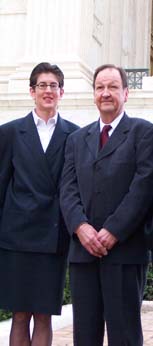 Lambda Legal attorney Ruth Harlow successfully won an appeal of John Lawrence's sodomy decision in front of the U.S. Supreme Court
Lambda Legal attorney Ruth Harlow successfully won an appeal of John Lawrence's sodomy decision in front of the U.S. Supreme Court  Conservative columnist Cal Thomas
Conservative columnist Cal Thomas 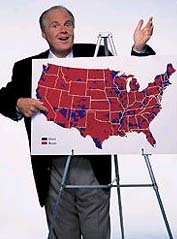 Rush Limbaugh's been screaming about the 'fallout' from the Supreme Court's sodomy ruling
Rush Limbaugh's been screaming about the 'fallout' from the Supreme Court's sodomy ruling 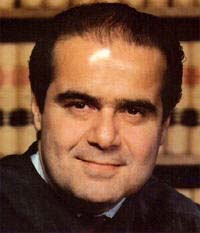 Justice Scalia's scare tactics in his dissent are being repeated by conservative groups as they attack the Lawrence v. Texas decision
Justice Scalia's scare tactics in his dissent are being repeated by conservative groups as they attack the Lawrence v. Texas decision 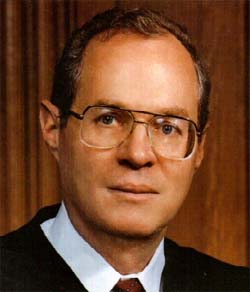 Justice Kennedy wrote the majority opinion in Lawrence v. Texas
Justice Kennedy wrote the majority opinion in Lawrence v. Texas